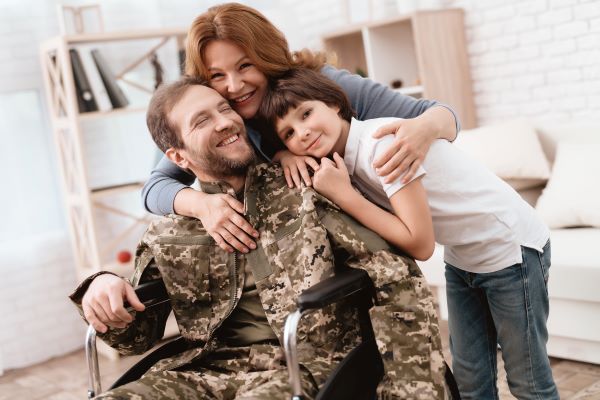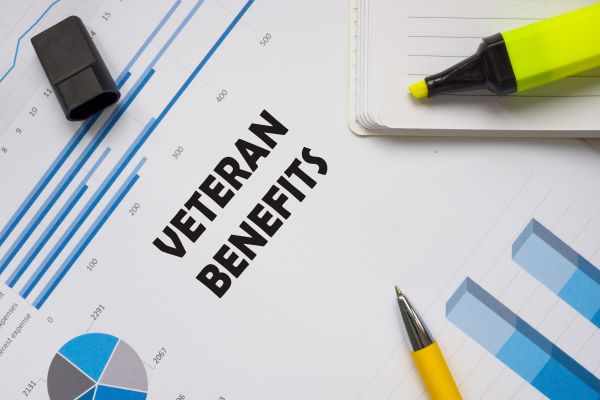Understanding the many veteran benefits programs offered by the Department of Veterans Affairs (VA) is…

Policy Issues Are Pushed by Disabled Veterans and Advocates
A nationwide network of VA offices assists disabled veterans with understanding and accessing government benefits. Generally, VA disability compensation provides tax-free monthly payments to veterans who became injured or sick during military service or whose condition worsened due to their service.
Like most government benefits, policy changes affect benefit eligibility, compensation, long-term care, and retirement benefits. Significant inroads have educated disabled veterans and their families through outreach programs, bringing government benefits, counseling, and claims filing assistance to light. However, more needs to be done.
Broader Policy Goals
The Disabled American Veterans (DAV) charitable organization routinely represents the interests of disabled veterans and their families, widowed spouses, and surviving children before the US Congress, the US Judicial Branch, and the White House. The organization also represents interests at the state and local government levels.
The DAV is advocating for lawmakers to focus efforts on specific areas of concern, including:
- Increasing mental health resources to ensure all veterans can access programs that reduce veteran suicide.
- Providing a full range of long-term care options for aging as well as service-disabled veterans.
- Ensuring equity exists in VA care, benefits, and services for women, minorities, and LGBTQ+ veterans.
- Fully implementing the PACT Act, addressing any gaps in toxic-exposure benefits.
- Expanding the capacity of the VA to deliver high-quality health care in a timely manner to veterans.
- Addressing and correcting inequities to provide compensation benefit parity for veterans and survivors.
Because of organizations like the DAV, federal, state, and local governments are more responsive to the changing needs and challenges disabled veterans face. Still, each disabled veteran has a unique set of circumstances of military service and disability that must translate from broader policy issues into actionable benefits solutions.
Veterans With Disabilities And The VA Budget
Although many advocacy groups and VA programs exist to help veterans experiencing disability, challenges remain. One of the most significant concerns is educating veterans with disabilities about access to available programs.
The three parts of the VA’s substantial budget:
- The largest spending is for income security, primarily disability compensation, followed by income security programs like pensions. (approximately $153 billion for 2023)
- A close second in spending is for medical care, including in-house and private-sector care, nursing homes, and research. (approximately $124 billion for 2023)
- Lastly, education and vocation programs, including housing guarantees, administration, and cemeteries. (approximately $21 billion for 2023)
The budget for spending programs that support veterans through Veterans Affairs is currently about $298 billion, over four percent of all federal spending. The VA disability compensation provides over 6 million recipients tax-free monthly benefits in recognition of disabilities. These disabilities can be from the effects of diseases, events, or injuries aggravated or incurred during active military service.
Additionally, VA disability compensation provides monthly payments to surviving spouses, dependent children, and parents in recognition of economic loss due to death related to military service or service-connected disability after a veteran’s discharge.
How a VA-Accredited Attorney Can Help
Navigating available VA benefit resources and eligibility rules is complex and ever-changing. While many charitable organizations can help, one of the surest ways to know what’s available and streamline the process of receiving benefits is to retain the services of a VA-accredited attorney or disability attorney.
Veterans Benefits
A veteran attorney understands the complex process of obtaining disability benefits from the Department of Veterans Affairs (VA). They can assist in gathering the necessary evidence, correctly filing the application, and appealing the decision if the claim is denied. A veteran attorney knows the latest VA laws and can ensure you receive the benefits you deserve.
Disability Claims
If you are a disabled veteran also seeking disability benefits from other sources, such as Social Security Disability Insurance (SSDI) or private insurance, a VA-accredited attorney can help with the application and appeals process. They can provide guidance on the eligibility criteria, gather supporting documentation, understand how one claim may affect benefits from another, and represent your interests throughout the entire process.
Military Discharge Upgrades
If a disabled veteran receives a less-than-honorable discharge affecting their access to benefits and services, a veterans benefits attorney can assist in pursuing a discharge upgrade. By evaluating the circumstances surrounding a discharge and gathering evidence to support the upgrade request, they can present a strong case to the appropriate review board.
Legal Advice and Advocacy
While many charitable organizations advocate for disabled veterans, nothing will replace the personalized attention a veterans benefits attorney can bring to your specific case. Issues may include your employment, housing, education, and access to healthcare. Your attorney can advocate and represent your interests in negotiations, administrative proceedings, or legal disputes related to your circumstances.
Estate Planning and Benefits Preservation
A VA-accredited, or veterans benefits attorney, can assist disabled veterans with estate planning to preserve their benefits. Considering individual circumstances, they can develop wills, trusts, powers of attorney, and more to protect your legacy. Your assets will be protected and wishes honored.
Pro Bono Services
Some veterans benefits attorneys offer pro bono or reduced-cost services to veterans in need. These attorneys volunteer their time and expertise to help disabled veterans facing financial challenges. Exploring local resources, legal aid organizations, or bar associations can help to identify attorneys providing pro bono services in your area. Attorney fees are generally regulated by your state and taken from proceeds after successfully settling the claim.
Contact our estate planning and elder law firm and speak with a VA-accredited attorney to learn about the benefits available to you. We can review your current status, identify ways to increase benefits, and help you apply for or appeal your claim successfully. If you would like to discuss your particular situation, please contact our New York office or call us at 607-271-9270. We look forward to the opportunity to work with you.



